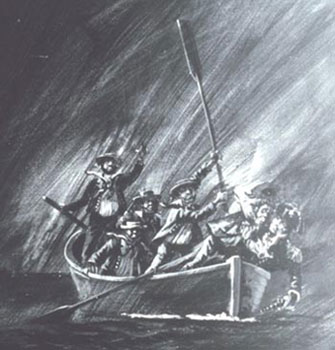From Discontent to Mutiny!
During the days of New England Whaling, less than ideal living and working conditions on board whaleships often lead to discontent. Many disputes between crew and officers were resolved by talking it through, but others lead to mutiny, which is a revolt against authority. Another name could be a "labor strike".
In the case of mutiny aboard a whaleship, it was generally low ranking crew members who rebelled against the Captain and his officers. Often it was only a fraction of the crew who organized themselves as mutineers to actually carry out their grievances or complaints. A mutiny might result in desertion or discharge, property damage, and sometimes even murder.
Regardless of the cause or the outcome, mutiny is always a crime. The law was that if the master said the crew was guilty, they were. Throwing whaling tools or implements overboard, disabling the windlass or cutting cordage are all considered mutiny. Ship burnings where no one was injured and the arsonists rarely identified, were mutinous as well.

Nasa: Visible Earth